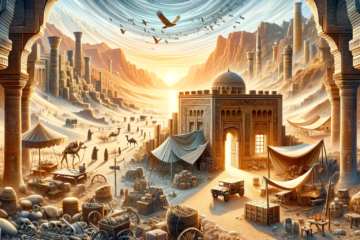Embark on a journey through time as we uncover the enchanting tapestry of Abu Dhabi’s desert safaris, a modern adventure deeply rooted in the ancient Bedouin traditions. Like a mirage turning into an oasis, the story of how these nomadic customs have shaped today’s thrilling desert experiences is both captivating and enlightening. Join us as we traverse the dunes of history and heritage, unraveling the threads that connect the past to the present.
Key Takeaways:
- Discover the sustainable living practices of the Bedouins and their influence on today’s desert safaris.
- Understand the cultural significance of falconry and its preservation in modern tours.
- Experience the traditional Bedouin mode of transportation with camel treks.
- Explore the Bedouin legacy through music, dance, and storytelling.
- Relish the flavors of traditional Bedouin cuisine integrated into safari culinary experiences.
- Learn about the Bedouin’s harmonious relationship with the desert ecosystem and ongoing conservation efforts.
The Bedouin Legacy
The Bedouins, nomadic tribes of the Arabian deserts, have been the custodians of the desert for centuries. Their lifestyle, deeply rooted in survival and resilience, adapted to the harsh desert environment. This profound connection with the desert is what shapes the foundation of modern desert safaris.
Sustainable Practices and Survival Skills
Bedouin tribes were masters of sustainable living, a practice that’s subtly integrated into today’s safari experience. They knew every plant, every dune, and every water source that could sustain life in the arid landscape. Modern safaris often include educational segments that teach these ancient survival skills, giving tourists a glimpse into the resourceful world of the Bedouins.
Falconry: A Symbol of Heritage
Falconry, a prestigious aspect of Arab heritage, was essential for Bedouin hunting. This ancient tradition is a highlight in many desert safaris, where guests can witness the majestic birds in action. The inclusion of falconry in desert safaris is not only a nod to the cultural significance of these birds but also an effort to preserve this age-old practice.
Camels: The Ships of the Desert
The camel, fondly referred to as the ‘ship of the desert’, was the Bedouin’s most valuable asset. Today, camel treks are a staple of desert safaris, offering a traditional mode of transport across the dunes. This experience is more than just a ride; it’s a journey through history, tracing the steps of the Bedouins.
Music and Dance: Echoes of the Past
Bedouin music and dance, integral to their cultural gatherings, continue to mesmerize. Many desert safaris conclude with evenings filled with traditional music and belly dancing, a celebration that mirrors the communal gatherings of the Bedouins.
Bedouin Tents: A Glimpse into Nomadic Life
The traditional Bedouin tent, known as ‘beit al shaar’, was a home on the move, crafted from goat hair. Modern desert safaris often feature overnight stays in luxury tents that are inspired by this Bedouin architecture, offering a taste of nomadic life but with the comforts of the modern world.
Storytelling: The Oral Tradition
Storytelling was the Bedouin’s way of passing down history, values, and lessons. Around the campfire, tales of heroism, love, and survival were shared. This tradition finds its way into desert safaris through guided tours and evening entertainment, where stories of the desert and its people are a crucial part of the narrative.
Cuisine: A Blend of Old and New
Bedouin cuisine, simple yet nourishing, has influenced the culinary offerings of modern desert safaris. Dishes like Harees and Majboos, cooked over an open fire, are often served, providing an authentic taste of traditional desert cuisine.
Dress and Adornments
The Bedouin attire, designed for practicality and comfort in the desert climate, has become a symbol of Emirati culture. Many safari operators offer guests the opportunity to wear traditional garments, such as the ‘Kandura’ for men and ‘Abaya’ for women, enhancing the cultural immersion.
The Art of Hospitality
Perhaps the most significant Bedouin contribution to modern desert safaris is their legendary hospitality. Bedouins believed in treating guests with the utmost respect and generosity. Today’s desert safari experiences embody this spirit, offering warm welcomes and exceptional hospitality, reflecting the deep-rooted Bedouin traditions of kindness and generosity.
Preservation of the Ecosystem
Bedouins lived in harmony with the desert, understanding the delicate balance of its ecosystem. Modern desert safaris often include conservation efforts, educating visitors about the importance of preserving this unique environment. This commitment to sustainability is a direct inheritance from the Bedouin way of life.
Impact on Tourism and Cultural Preservation
The transformation of the Bedouin lifestyle into a tourism experience has played a crucial role in preserving these traditions. As visitors from around the world partake in these safaris, they carry with them an understanding and appreciation of Bedouin culture, ensuring its continuity.
Conclusion
The modern desert safari in Abu Dhabi is more than just an adventure; it’s a cultural journey that bridges the past with the present. Through the integration of Bedouin traditions, these safaris offer a comprehensive experience that is both educational and entertaining. As we traverse the dunes and enjoy the luxuries of today’s safaris, it’s essential to remember and honor the Bedouin heritage that has shaped this unique adventure. In preserving these traditions, desert safaris serve as a testament to the enduring spirit of the Bedouin culture, a culture that continues to fascinate and inspire.


